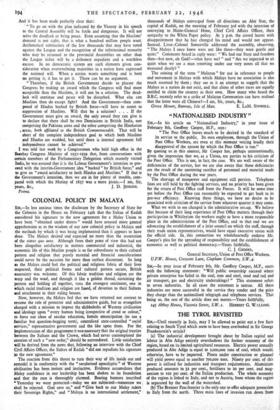COLONIAL POLICY IN MALAYA
Snt,—In less anxious times the disclosure by the Secretary of State for the Colonies in the House on February 54th that the Sultan of Kedah considered his signature to the new agreement for a Malay Union to have been " obtained under duress " would have aroused more general apprehension as to the wisdom of our new colonial policy in Malaya and the methods by which it was being implemented than it appears to have done. The Malays desired and expected no more than the restoration of the status quo ante. Although from their point of view this had not been altogether satisfactory in matters commercial and industrial, the economic life of this Muslim people is so far subordinate to their cultural pattern and religion that purely material and financial considerations could never be the occasion for more than surface discontent. So long as the Malays could feel the political and religious fabric of their lives respected, their political forms and cultural pattern secure, British suzerainty was welcome. Of this fabric tradition and religion are the warp and the woof, and through it like a golden thread, sustaining the pattern and holding all together, runs the strongest sentiment, one in which racial tradition and religion are fused, of devotion to their Sultans and attachment to their ruling houses.
Now, however, the Malays feel that we have returned not content to resume the role of protector and administrative guide, but as evangelists charged with a mission to impose the shibboleths of Western civilisation and ideology upon " every human being irrespective of creed or colour," to force our ideas of secular education, female emancipation (to use a familiar but , question-begging term), centralised state-controlled " social services," representative government and the like upon them. For the implementation of this programme it was necessary that the original treaties between the Sultans and the Crown, which had never contemplated the a-eation of such a "new order," should be surrendered. Little satisfaction will be derived from the news that, following an interview with the Chief Civil Affairs Officer, the Sultan of Kedah "did not repudiate his signature to the new agreement."
The reaction from this threat to turn their way of life inside out and remodel it in conformity with the " secularised apocalyptic" of Western civilisation has been instant and instinctive. Evidence accumulates that Malay confidence in our leadership has been shaken to its foundation and that the race is thoroughly alarmed. Bearing banners inscribed " Yesterday we were protected—today we are subjected—tomorrow we shall be rejected. God save us," and " Give back to our Malay rulers their Sovereign Rights," and " Malaya is no international settlement," thousands of Malays converged from all directions on Alor Star, the capital of Kedah, on the morning of February 3rd with the intention of conveying to Major-General ' Hone, Chief Civil Affairs Officer, their antipathy to the White Paper policy. At 3 p.m. the crowd learnt with disappointment that he had changed his mind and would not appear. Instead. Lieut.-Colonel Somerville addressed the assembly, observing, " The Malays I once knew were not like these—they were gentle and quiet." Comments heard in reply were: " We had our State and freedom then—but now, oh God !—what have we? " and "Are we expected. to sit quiet when we see a man removing under our very noses all that we treasured dearly? "
The coining of the term " Malayan " for use in reference to people and movement in Malaya with which Malays have no association is also much resented by them ; they see in it an attempt to suggegt that the Malays as a nation do not exist, and that aliens of other races are equally entitled to claim the country as their own. How many who heard the B.B.C. recently refer to a strike of Malayan Communists can have realised that the latter were all Chinese?—I am, Sir, -yours, &c., Grove Mount, Ramsay, Isle of Man. E. LAM. STOWELL.






























 Previous page
Previous page